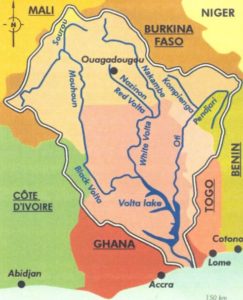Charter to control water use in the Volta Basin
 Six countries within the West African sub-region, which share one water course through the Volta basin, have collectively drafted a Charter to guide the use and management of the Basin.
Six countries within the West African sub-region, which share one water course through the Volta basin, have collectively drafted a Charter to guide the use and management of the Basin.
The Volta, the trans-boundary water course is shared by Ghana, Togo, Benin, Burkina Faso, Cote d’Ivoire and Mali.
The Water Charter, which is at the validation stage, when completed, would clarify the roles and responsibilities of the riparian countries in the use of the water resources, strengthen the Volta Basin Authority’s mandate to promote a harmonious and coordinated water policy in the basin and define the principles that allow sustainable integrated water resources management.
It is to envisage common principles about how the water and water ecosystems should be utilised and protected for the benefit of present and future generations.
Ghana’s validation workshop to review the draft Volta Basin Water Charter was held at Dodowa in the Greater Accra Region, with a call on participants to put forth amendments that will be used to finalise the document in preparation for the regional workshop.
Mr Joseph Kofi Adda, Minister of Sanitation and Water Resources, in a speech to the over 50 participants from stakeholder institutions, said empirical studies over the past 50 years have shown that the total number of water-related events between nations was weighed towards cooperation.
“Implying that Cooperation over water and not conflict is the most strategically rational, effective and economically viable choice for nations to make,” he said in a speech read for him by Mr Donnan Kobla Tay, Director of Water at the Ministry.
Quoting from Mr Kofi Annan, the past Secretary General of the United Nations, Mr Adda said, “Fierce competition for fresh water may well become a source of conflict and wars in the future. But our water problem need not be only a cause of tension; they can be a catalyst for cooperation. If we work together, a secured and sustainable water future can be ours.”
He said such thinking had influenced Ghana’s strategic position of cooperating with her riparian neighbours to collectively manage and share the benefits of the country’s trans-boundary rivers and aquifers.
The Minister congratulated Ghanaians and their riparian neighbours for continuously demonstrating genuine concern to manage and develop their shared water resource by partaking in international cooperation and arrangements among and between themselves.
He said “Despite some obvious challenges, we should all be delighted that our collective efforts and cooperation have culminated in the steady growth of the Volta Basin Authority (VBA) in promoting the proper management and development of the water resources as well as ensuring the equitable sharing of the benefits thereof among all the riparian countries of the Volta”.
He called on the countries to be mindful of the herculean but surmountable task ahead of them as they try to make the VBA viable and a model institution worthy of emulation.
Mr Ben Yaw Ampomah, Executive Secretary, Water Resources Commission and National Focal person, appealed to all stakeholders to take charge of the process and address all the legal and institutional framework to help Ghana benefit as the downstream receiver of the water resource from all the other countries.
Mr Jean-Marie Durel Ouya, Director of Administration and Finance, Volta Basin Authority, who spoke on behalf of the Executive Director, Mr Dessouassi Robert, said the water charter was a key document for the future of the six countries, and that, the validation process will take place in all the countries to ensure that all parties were satisfied with the process.
He promised that there would be a final workshop where all state parties will come together with their final input before the end of the year.
The process is being financed by the World Bank and the Global Environment Fund. The Volta Basin covers an area of 400,000 kilometres square and is home to over 25 million inhabitants (in 2010).
The Black Volta also known as Sourou-Mouhoun, the White Volta as Nakanbe, and the Oti, all merge into the Lower Volta along the way and flows into the Atlantic Ocean
When completed, the Charter will be deposited at the United Nations Headquarters for ratification and adoption by member states.
Source: GNA
